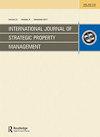Strategies of Multinational Corporations in Emerging Markets in Indonesia
IF 1.7
4区 管理学
Q3 MANAGEMENT
引用次数: 0
Abstract
Purpose: The aim of the study was to examine the strategies of multinational corporations in emerging markets in Indonesia Methodology: The study adopted a desktop methodology. Desk research refers to secondary data or that which can be collected without fieldwork. Desk research is basically involved in collecting data from existing resources hence it is often considered a low cost technique as compared to field research, as the main cost is involved in executive’s time, telephone charges and directories. Thus, the study relied on already published studies, reports and statistics. This secondary data was easily accessed through the online journals and library Findings: Multinational corporations (MNCs) in Indonesia's emerging markets exhibit a preference for collaborative entry strategies, emphasizing joint ventures and strategic alliances. These approaches enable MNCs to harness local expertise and navigate the complexities of the Indonesian market effectively. Government policies play a pivotal role in shaping MNC strategies, with favorable policies attracting greater foreign investment and expansion. Industry-specific competitive strategies, including price competition, technology differentiation, and product innovation, are tailored to meet local market demands. Additionally, MNCs actively engage with the Unique Contribution to Theory, Practice and Policy: Eclectic paradigm (OLI Framework), Resource-based view (RBV) & Institutional theory may be used to anchor future studies on the examining the strategies of multinational corporations in emerging markets in Indonesia. Encourages MNCs to build meaningful partnerships, leveraging local expertise and networks, which can be crucial for navigating complex regulatory environments and market dynamics. Engaging in policy advocacy represents a proactive approach by MNCs to shape the regulatory landscape in their favor while contributing to the host country's economic development.跨国公司在印尼新兴市场的战略
目的:本研究的目的是考察跨国公司在印尼新兴市场的战略
方法学:本研究采用桌面方法学。案头研究指的是二手数据或不需要实地调查就能收集到的数据。案头调查基本上涉及从现有资源中收集数据,因此,与实地调查相比,案头调查通常被认为是一种成本较低的技术,因为主要费用是行政人员的时间、电话费和通讯录。因此,这项研究依赖于已经发表的研究、报告和统计数据。这些辅助数据很容易通过在线期刊和图书馆获得
研究结果:印度尼西亚新兴市场的跨国公司(MNCs)表现出对合作进入战略的偏好,强调合资企业和战略联盟。这些方法使跨国公司能够利用当地的专业知识,有效地驾驭印度尼西亚市场的复杂性。政府政策在跨国公司战略的形成中起着关键作用,其优惠政策吸引了更多的外国投资和扩张。特定行业的竞争策略,包括价格竞争、技术差异化和产品创新,都是为满足当地市场需求而量身定制的。此外,跨国公司积极参与
对理论、实践和政策的独特贡献:折衷主义范式(OLI框架)、资源基础观(RBV) &制度理论可以用来锚定未来研究跨国公司在印尼新兴市场的战略。鼓励跨国公司建立有意义的伙伴关系,利用当地的专业知识和网络,这对于驾驭复杂的监管环境和市场动态至关重要。参与政策宣传代表了跨国公司积极主动的做法,以塑造有利于他们的监管环境,同时为东道国的经济发展做出贡献。
本文章由计算机程序翻译,如有差异,请以英文原文为准。
求助全文
约1分钟内获得全文
求助全文
来源期刊
CiteScore
4.00
自引率
18.50%
发文量
23
审稿时长
15 weeks
期刊介绍:
International Journal of Strategic Property Management is a peer-reviewed, interdisciplinary journal which publishes original research papers. The journal provides a forum for discussion and debate relating to all areas of strategic property management. Topics include, but are not limited to, the following: asset management, facilities management, property policy, budgeting and financial controls, enhancing residential property value, marketing and leasing, risk management, real estate valuation and investment, innovations in residential management, housing finance, sustainability and housing development, applications, etc.

 求助内容:
求助内容: 应助结果提醒方式:
应助结果提醒方式:


